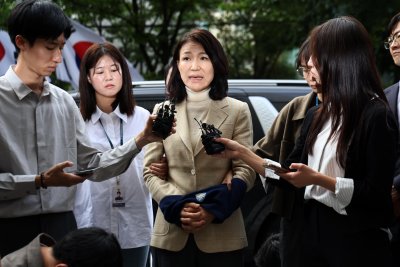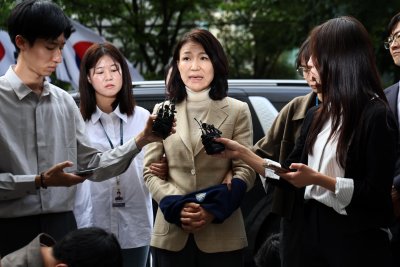
South Korea’s former chief of the Korea Communications Commission Lee Jin-sook spoke to reporters as she arrived handcuffed at the Seoul Southern District Court for a court review of the legality of her detention Saturday. The court ordered her release after reviewing her habeas corpus petition. Photo by Yonhap/EPA
SEOUL, Oct. 6 (UPI) — A Seoul court accepted the petition of Lee Jin-sook, the former head of the now-defunct Korean Communications Commission, to be released from detention on Saturday.
Lee was arrested on Thursday on charges of violating election law and breaching public neutrality. The allegations centered around her making partisan remarks on conservative YouTube channels and social media, which prosecutors said were aimed at obstructing the election of President Lee Jae Myung.
Police said that they executed the warrant after the head of the former broadcasting watchdog failed to respond to six summonses for questioning. Lee, however, claimed that the police had agreed on a scheduled appearance date and issued the summonses to build a justification for her arrest.
Her arrest occurred a day after the KCC was abolished as part of a politically contentious government reorganization, which automatically ended her term at the commission. Lee had been appointed to a three-year term in July 2024 by former President Yoon Suk Yeol, who was impeached over his botched martial law attempt and removed from office in April.
Lee’s lawyers filed a petition requesting a judicial review of the lawfulness of her arrest, which the Seoul Southern District Court heard on Saturday. The court granted her request for release, with Chief Judge Kim Dong-hyun saying the arrest was “not justified at this stage.”
In the court’s decision, Judge Kim said that the investigation had already been conducted to a substantial extent and that the facts in the case were not in dispute, noting that Lee had promised to attend future hearings.
The court did not deny that the arrest may have had legal grounds, Kim added, and acknowledged that further investigation was necessary.
Lee was released from detention at Yeongdeungpo Police Station in Seoul shortly after the ruling and placed the responsibility for her arrest on President Lee Jae Myung.
“The scene you are seeing implies that if you disobey the president, you too could end up in detention,” she said to reporters, as opposition People Power Party lawmakers and conservative supporters gathered outside the station.
“The judiciary has freed us from the handcuffs imposed by the police and prosecutors,” she added. “It gives me hope that democracy still exists in some corner of South Korea.”
